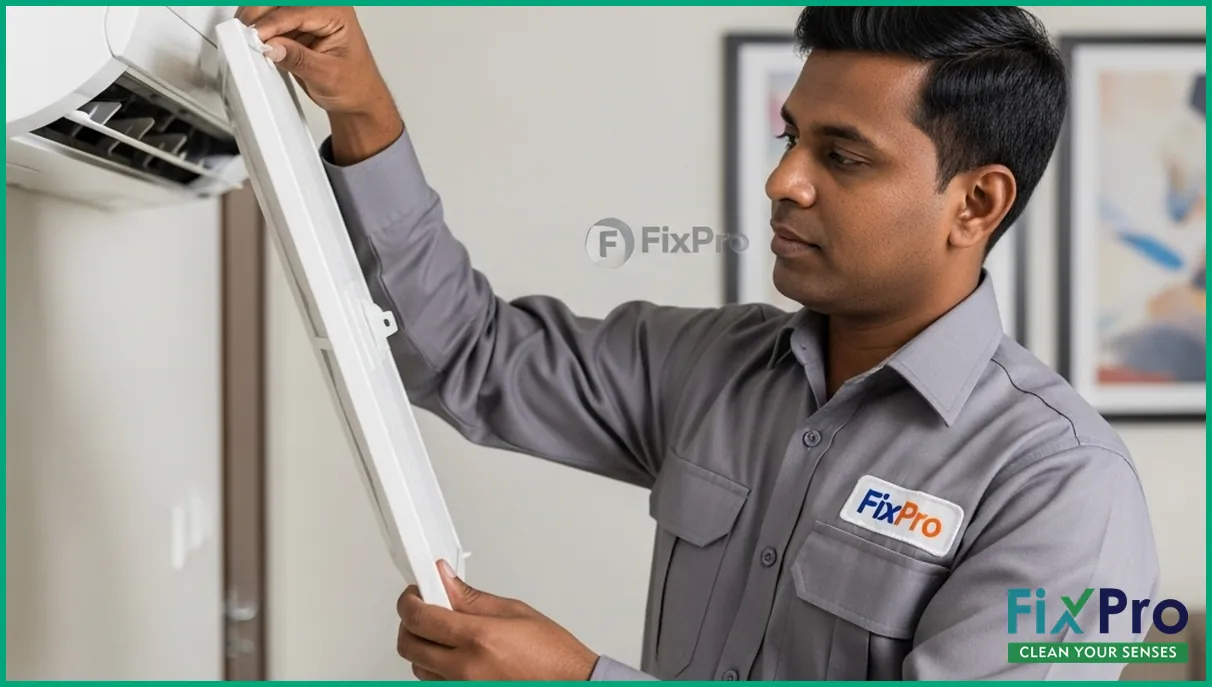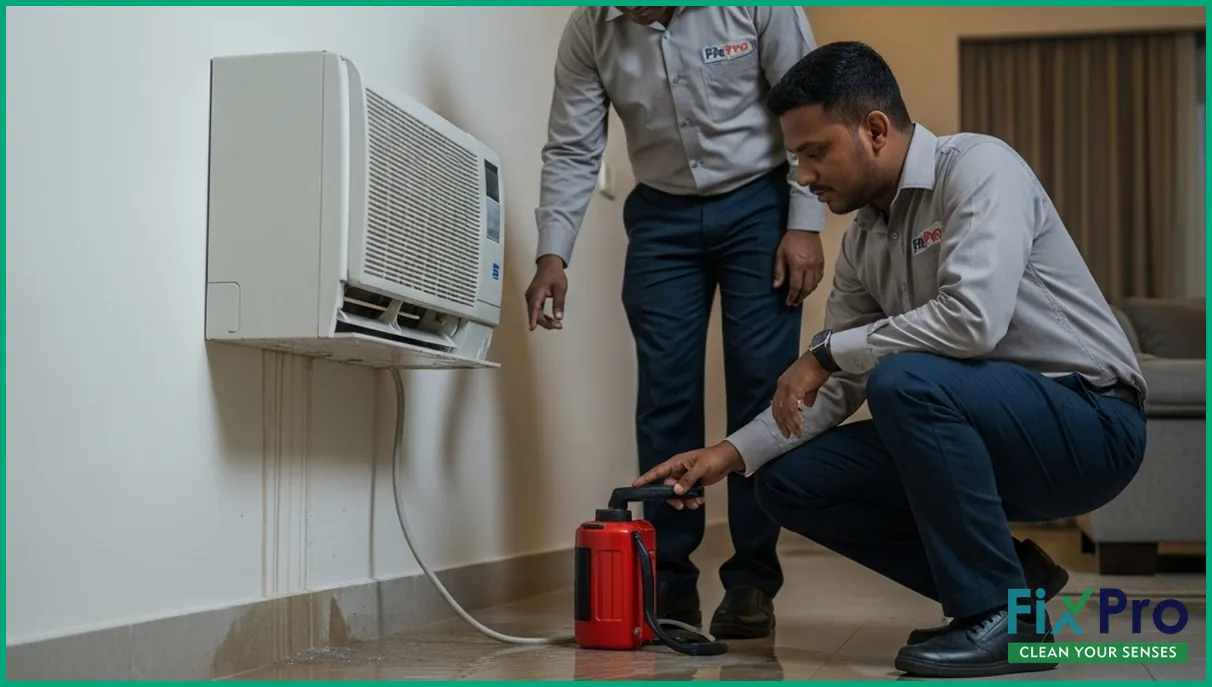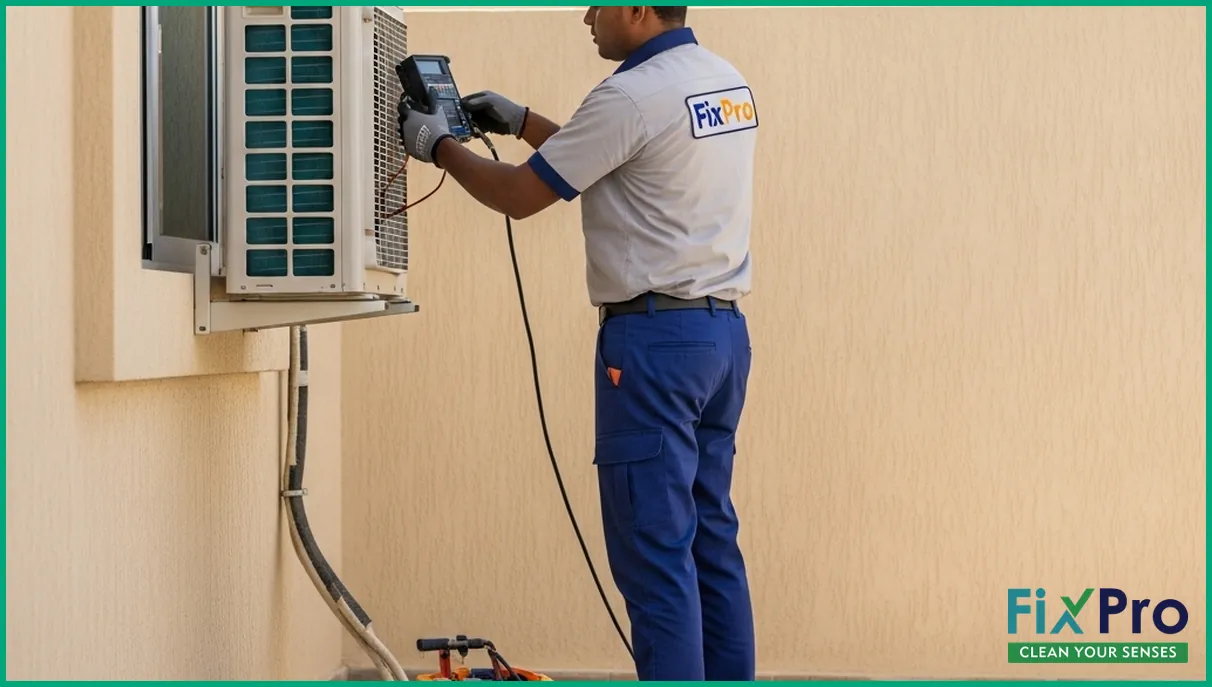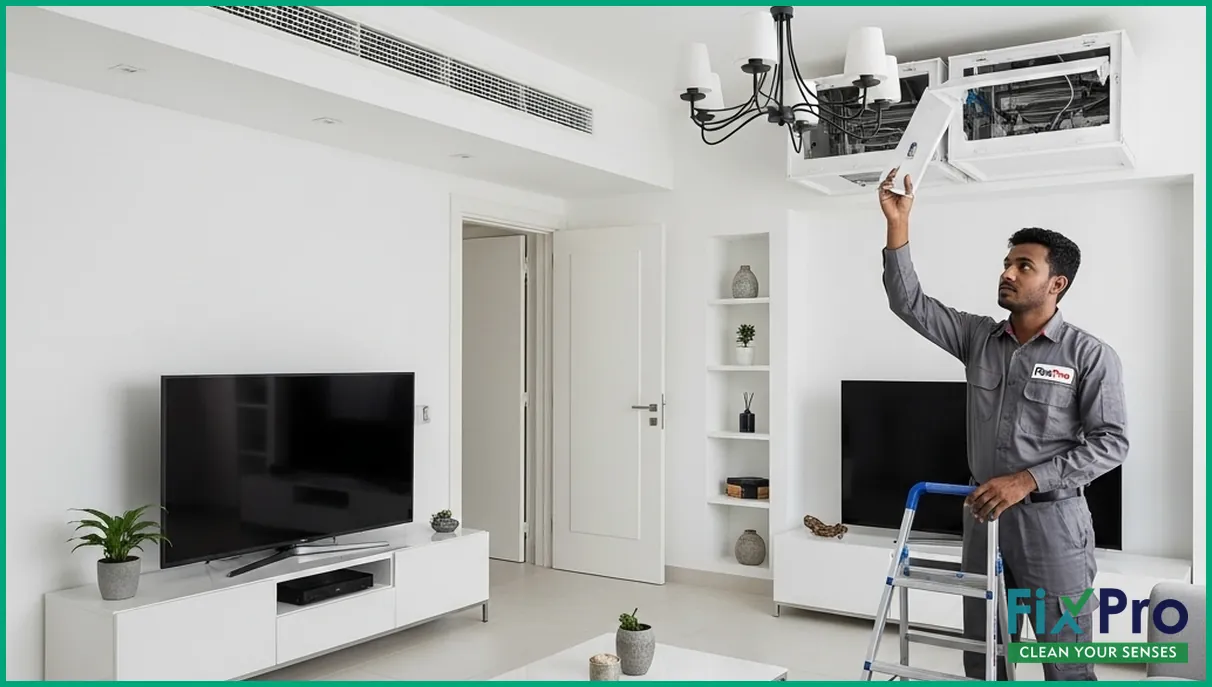Why AC Units Struggle in Abu Dhabi
Abu Dhabi’s climate puts immense pressure on air conditioning units. High temperatures, dust, and humidity all play a part. Most homes use split or central AC systems, and both can run into trouble if not maintained regularly. The constant exposure to fine desert sand can cause internal parts to wear out faster, and humidity can lead to mold, especially in closed spaces.
ACs in Abu Dhabi also face electrical fluctuations due to frequent power surges, especially during peak summer afternoons. This can disrupt sensitive components and lead to system resets or failures. If you live closer to the coast, salt in the air can corrode outdoor units, making regular checks even more important.
Most Common AC Unit Issues in Abu Dhabi
1. Weak or Warm Airflow
If your AC is running but the air feels weak or warm, the culprit is often a clogged filter, dirty evaporator coils, or low refrigerant. In Abu Dhabi, sand and dust clog filters faster than you might expect. Sometimes, blocked vents or closed dampers can also restrict airflow, especially in multi-room apartments or villas.
- Check and replace filters monthly during peak summer.
- Clean evaporator coils if accessible.
- If airflow stays weak, call a technician to inspect refrigerant levels.
- Vacuum around indoor units regularly to minimize dust intake.
- Make sure all supply and return vents are open and unblocked by furniture or curtains.
- In coastal areas, inspect for salt buildup on coils and rinse gently with water if needed.

For best results, keep a spare set of filters and rotate them. If you have pets, consider changing filters even more frequently. When prepping to change a filter, turn off the AC, wear a dust mask, and wipe the surrounding area to prevent loose debris from falling into the unit.
2. Strange Noises from the AC Unit
Rattling, buzzing, or squealing sounds are not normal. Loose panels, debris in the outdoor unit, or worn-out fan belts are the usual suspects. Tighten any loose screws and clear debris. If the noise persists, it may be time for professional AC unit maintenance. Sometimes, insects or small animals can get into outdoor units, especially in villa gardens, causing odd noises or blockages.
- Turn off the power before inspecting for loose parts or foreign objects.
- Use a flashlight to check inside the outdoor unit for twigs, leaves, or nests.
- Listen for grinding or screeching, which may signal a failing motor or worn bearings.
- If you hear clicking when the AC starts, check the relay switch or thermostat connections.
- For persistent squealing, avoid running the unit until a technician inspects the fan belt or motor.
Regional tip: In high-rise apartments, wind can cause loose exterior panels to vibrate. Secure all panels tightly, especially before sandstorms.
3. Water Leaks or Excess Moisture
AC units in Abu Dhabi often leak water due to clogged drain lines or frozen coils. Check the drain pan and lines for blockages. If you see ice, turn off the unit and let it thaw before restarting. Persistent leaks mean you should call for a proper inspection. Humidity also accelerates algae growth in drain pipes, which can lead to blockages.

- Flush the drain line with a mix of water and mild vinegar to clear algae and debris.
- Check for cracks in the drain pan and replace if necessary.
- Ensure the AC unit is level; a tilted unit can cause water to spill over the drain pan.
- If you notice mold or a musty smell, clean the area with a disinfectant and keep the area dry.
- For rooftop or balcony-mounted units, check that external drains are not blocked by sand or leaves.
If you’re prepping to clean the drain line, turn off the AC, locate the drain pipe (usually a white PVC tube), and use a small funnel to pour the cleaning solution. Wait 30 minutes before restarting.
4. AC Not Turning On or Shutting Off Unexpectedly
If your AC won’t start, check the thermostat batteries and circuit breakers. Power surges, common in the region, can trip breakers or damage control boards. If the unit shuts off randomly, it could be overheating due to dirty filters or faulty sensors. Sometimes, a faulty remote or wall switch can also be the cause.
- Reset breakers and check thermostat settings.
- Replace batteries if needed.
- Schedule maintenance if problems persist.
- Unplug the unit for 5 minutes to allow the system to reset after a power surge.
- Inspect the AC plug and socket for signs of burns or loose connections.
- In older buildings, check for voltage fluctuations with a surge protector or voltage stabilizer.
If you have a smart thermostat, ensure it’s connected to Wi-Fi and the correct mode is selected. Sometimes, software glitches can cause unexpected shutdowns—try rebooting the device or updating its firmware.
Quick Comparison: Common AC Issues and DIY Fixes
| Issue | Likely Cause | DIY Fix |
|---|---|---|
| Weak Airflow | Clogged filter or coils | Replace filter, clean coils |
| Strange Noises | Loose parts or debris | Tighten screws, clear debris |
| Water Leak | Clogged drain line | Clear drain line gently |
| Unit Won’t Start | Tripped breaker, bad thermostat | Reset breaker, check thermostat |
| Musty Smell | Mold in ducts or filters | Clean/replace filters, schedule duct cleaning |
| Short Cycling | Overheating, faulty sensors | Clean filters, check for airflow obstructions |
For persistent or unclear problems, avoid DIY fixes that involve refrigerant or electrical wiring. These require specialized tools and safety precautions. Always turn off the power before attempting any inspection or cleaning, and keep children and pets away from work areas.
When to Call for Professional AC Unit Maintenance
Some problems need an expert. If your AC blows hot air after cleaning, leaks refrigerant, or trips breakers repeatedly, it’s time to call in a professional. Regular HVAC maintenance can prevent these headaches. Technicians can also check for hidden issues like electrical faults, refrigerant leaks, or blocked ducts that aren’t easily visible.

- Book a professional check-up before summer begins for peak performance.
- Ask for a full system inspection, including ductwork, coils, refrigerant, and electrical components.
- Request a report on parts that may need replacement soon, such as capacitors or fan motors.
- For villas, ensure the outdoor unit is cleaned of sand, leaves, and bird droppings.
- For apartments, have the technician check shared building ducts for blockages or pest infestations.
If you’re renting, ask your landlord about the building’s AC maintenance schedule. In serviced apartments, building management may provide routine checks, but it’s still wise to monitor your own unit for early warning signs.
Preventive Tips: Keep Your AC Running Smoothly
- Change or clean filters every 1–2 months, especially during dust storms.
- Keep vents and ducts unobstructed for better airflow.
- Schedule ac duct cleaning at least once a year to remove dust buildup.
- Clear the area around outdoor units to prevent overheating.
- Monitor for leaks or unusual noises and address them early.
- Wipe down remote controls and thermostat screens to keep sensors responsive.
- Use door draft stoppers and thick curtains to keep cool air inside, reducing AC strain.
- When away for extended periods, set the thermostat to a higher temperature or use ‘vacation mode’ to save energy.
- Pair regular AC maintenance with cleaning ceiling fans and exhaust fans to circulate air more effectively.

For extra cooling, consider pairing your AC use with light meals and hydrating drinks. Serve cold salads, fruit, and plenty of water to keep your family comfortable. If you like fresh bread, try making sandwiches or wraps to avoid using the oven, which can add heat indoors. Hosting guests? Set the AC to a comfortable 23–24°C, and use fans to help circulate cool air evenly throughout the room.
How AC Maintenance in Abu Dhabi Differs from Other Places
The combination of heat, dust, and humidity in Abu Dhabi makes AC unit maintenance more frequent and essential than in milder climates. Filters, coils, and ducts collect dust faster, and the risk of mold is higher due to humidity. It’s not just about comfort—it’s about keeping indoor air healthy and energy bills manageable.
- Homes near construction sites may need more frequent checks.
- Humidity can cause mold in ducts if not cleaned regularly.
- Outdoor units exposed to sun and sand need extra attention.
- In coastal zones, salt corrosion can damage condenser fins—rinse gently with fresh water monthly.
- During sandstorms, cover outdoor units with breathable fabric covers to reduce sand intrusion.
- Older buildings may have less efficient insulation, so check window and door seals for air leaks.
In comparison, AC units in cooler or less dusty regions may only need filter changes every 3–6 months. Here, monthly attention is the norm. If you split time between Abu Dhabi and another city, set reminders to check your AC before leaving and after returning, especially if your home sits vacant for weeks.
FAQs: AC Unit Issues in Abu Dhabi
How often should I change my AC filter?
In Abu Dhabi, change or clean filters every 1–2 months, especially during dusty periods.
For households with pets, smokers, or near construction, check filters every 3–4 weeks. If you notice visible dust on vents or a drop in cooling, replace the filter immediately. Keep a small stock of filters on hand so you’re never caught off guard.
What causes my AC to leak water inside?
Usually, it’s a clogged drain line or frozen coil. Clear the line and let ice thaw before restarting.
In high humidity, running the AC at a very low temperature can cause coils to freeze and then leak as they thaw. Adjust the thermostat to 24°C or higher to reduce this risk. If leaks persist, check for signs of mold or algae in the drain pan and schedule a professional cleaning.
Why does my AC smell musty when I turn it on?
Mold or bacteria in ducts or filters often cause musty smells. Schedule a professional cleaning.
Try running the AC fan (without cooling) for 15 minutes after turning off the unit to help dry out moisture. Use a HEPA air purifier in rooms with persistent odors. For a quick fix, place a bowl of baking soda near the return vent to absorb smells until you can arrange a thorough cleaning.
Is it safe to clean AC coils myself?
You can gently clean accessible coils, but avoid harsh chemicals or force. For deep cleaning, hire a pro.
If you attempt coil cleaning, use a soft brush or vacuum with a brush attachment. Always turn off the power first. Never use metal tools or abrasive pads, as these can bend the fins and reduce efficiency. If you’re unsure, ask your technician to show you safe cleaning techniques during their next visit.
How can I reduce AC energy bills in summer?
Keep filters clean, set the thermostat higher when away, and ensure windows and doors are sealed.
Use ceiling fans to help circulate cool air, allowing you to set the AC a few degrees higher. Install reflective window films or shades to block direct sunlight. For gatherings, serve cold dishes and drinks to keep the kitchen cool and reduce overall heat load. Regular maintenance and duct cleaning also keep your system running efficiently, saving energy in the long run.
Can I run my AC all day during peak summer?
Yes, but it’s best to give your AC short breaks to prevent overheating and wear. Use timers or smart thermostats to cycle the unit off when rooms are unoccupied. During midday heat, close curtains and minimize appliance use to help your AC keep up without overworking.
What should I do if my AC remote stops working?
Replace the batteries and clean the sensor on both the remote and the AC unit. If it still doesn’t work, try resetting the AC by turning it off at the breaker for a few minutes. Universal remotes are available at most electronics stores in Abu Dhabi as a quick replacement.
Methodology & Limitations
This article is based on common experiences of homeowners, input from local technicians, and general maintenance practices in Abu Dhabi. We reference practical tips from industry professionals and typical service recommendations. Since every AC system and home environment is unique, your experience may differ. Always consult a certified technician for complex or persistent problems.
The advice here is intended for Abu Dhabi’s unique climate and may not apply in other regions. All troubleshooting tips assume basic safety precautions are followed. For warranty protection, check your AC manual before attempting any DIY repairs.
Your Next Step: Stay Cool and Prevent AC Surprises
If your AC is showing any of these issues, start with simple checks—filters, thermostats, and visible debris. For persistent problems, schedule a professional inspection. Fixpro offers reliable help for AC unit maintenance and related services. If you haven’t had your ducts cleaned recently, consider booking a duct cleaning to keep your system efficient.
For day-to-day comfort, keep a maintenance checklist on your fridge or phone. Pair AC care with seasonal home cleaning, and involve family members so everyone knows what to watch for. A little attention now can save you from major breakdowns—and keep your Abu Dhabi home cool all year.